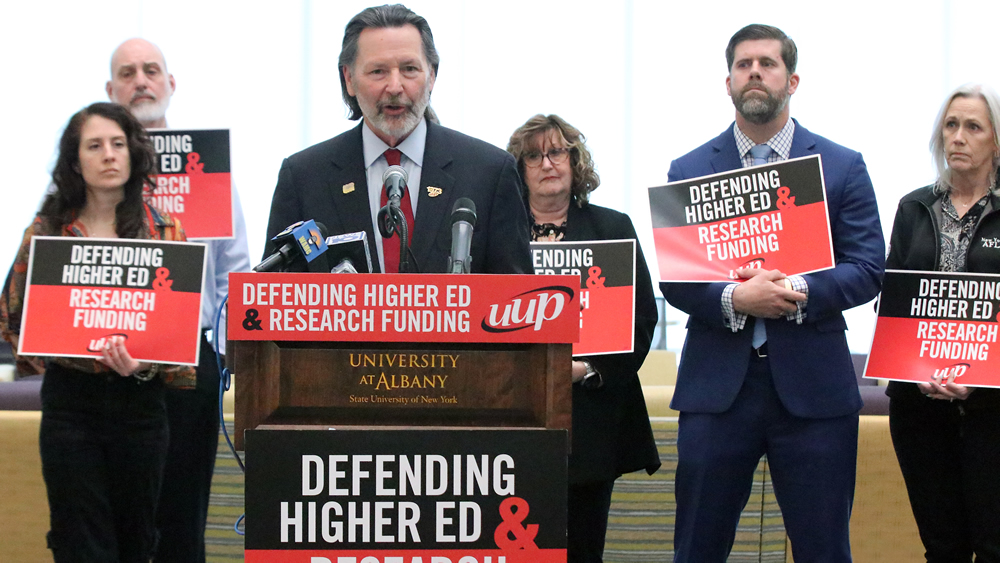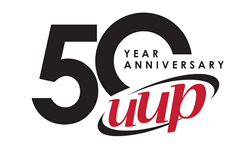March 28, 2025

Years of research into deadly diseases have fallen apart in the first three months of the new administration, as federal grants stall or stop, federal agencies essentially shut down and the country’s international reputation for scientific advances tanks.
Three University at Albany scientists delivered that bleak assessment of federally funded research at their campus and at universities around the country at a March 27 press conference hosted by UUP. The event was held at UAlbany’s Emerging Technology and Entrepreneurship Complex in Albany.
The researchers and other higher ed advocates depicted a storied history of internationally acclaimed research that is being systematically dismantled, despite several federal court orders in the last two months that should have reversed the dismantling of the grant system, but which the administration has steadily bucked. Very little in terms of research funded by the National Institutes of Health or other federal agencies has been restored or advanced, despite those court orders.
“Frankly, it’s incredible that this is even happening,” UUP President Fred Kowal told the gathering. “The critical research being done at UAlbany is being delayed and could be derailed.”
Several UUP statewide officers were at the event, including Vice President for Academics Alissa Karl, Vice President for Professionals Carolyn Kube and Membership Development Officer Patrick Romain. Philippe Abraham, a former UUP statewide officer and NYSUT statewide Secretary-Treasurer, spoke at the press conference.
Staff face cuts, applications go nowhere
JoEllen Welsh, a SUNY Distinguished Professor, an Empire Innovation professor and lab director at the University at Albany Cancer Research Center, said the destruction of funding will have a generational effect on medical advances and will create “a huge gap in trained scientists in the foreseeable future.”
Lab staff will be let go if there’s no relief soon, and promising graduate students may leave their research careers altogether, Welsh said. Her colleagues at the press conference agreed.
“Right now, we have undergraduate research students who don’t see a future, who may change their careers—it’s scary,” said J. Andrew Berglund, director of UAlbany’s RNA Institute and a SUNY Distinguished Professor. He described an application for a $5 million grant into a common and serious form of muscular dystrophy, for which he expected to have a meeting with federal officials Jan. 28 as part of the required process for grant approval. That meeting was canceled and was not rescheduled.
Also, as the administration has started dismembering federal agencies, including the Department of Education, researchers like Paul Morgan, an Empire Innovation Professor and director of UAlbany’s Institute for Social and Health Equity, fear the loss of decades of priceless data those agencies have collected.
“They are being cut left and right,” he said. “That we’re doing this so indiscriminately—we’re shooting ourselves in the foot.”
“The cuts are happening now so quickly and so indiscriminately that it’s difficult to plan,” Morgan reiterated in response to a reporter’s question about whether any other private funding sources could fill the gap. His response about private funding: It probably won’t have any effective results, because very few private foundations or corporations can fund research at the level of the federal government.
Local economy will feel the cuts
UAlbany is a powerhouse of federally funded research. In Fiscal Year 2024, the university reported nearly $105 million in federally funded research and development projects. The grants cover research areas including life sciences, engineering, social sciences and atmospheric/geological sciences, for projects studying cancer, neuromuscular diseases, hurricanes and better computer chips.
It is difficult to determine how many grants have resumed throughout the SUNY system in response to court orders, but several researchers at the University at Buffalo said recently that National Institutes of Health grants, in particular, remain in chaos despite the fact that they were supposed to resume.
As research programs shut down and lab staff lose their jobs, the economic effect will be felt throughout the Capital Region, Albany Mayor Kathy Sheehan said during the press conference.
“This is one of the most short-sighted things I’ve ever seen a government do,” Sheehan said. “This is mean-spirited. This is an attack on the things we need to do to move our country forward, and we need to say ‘No.’”
International students a target
Nationally, reports of international students in the United States with proper visas and no criminal record being arrested and detained by Immigration and Customs Enforcement have sent additional shock waves through the academic research community.
In the latest incident, a Tufts University graduate student from Turkey was arrested just outside of Boston March 25 and was sent to a federal detention center in Louisiana. Video footage from a nearby security camera showed her struggling as black-garbed agents with no identifying insignia on their jackets surrounded her and restrained her.
That student is the seventh student or scholar detained or refused entry to the United States in March, according to reporting by the Washington Post. The administration accuses detained students of engaging in antisemitic actions; critics of the detentions say students are being pulled off the street for simply exercising free speech.
The New York Times has also recently reported that European universities are recruiting researchers from the United States in the face of the administration’s cuts and crackdowns, and that some American researchers are already moving overseas.
“Don’t despair; don’t give up hope,” he told the gathering. “In other parts of our American history, we have built mighty movements, and we have said, ‘Enough.’”

